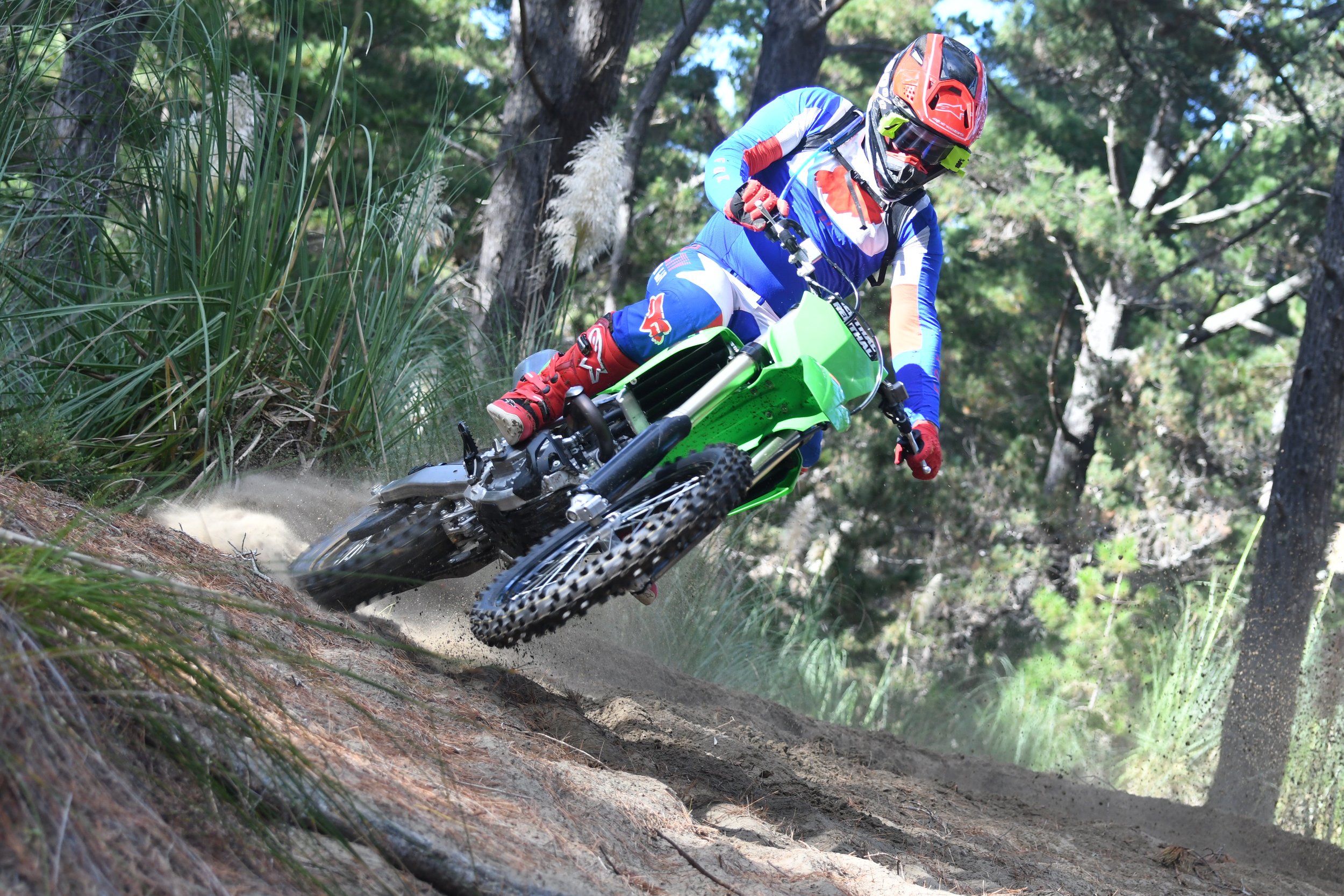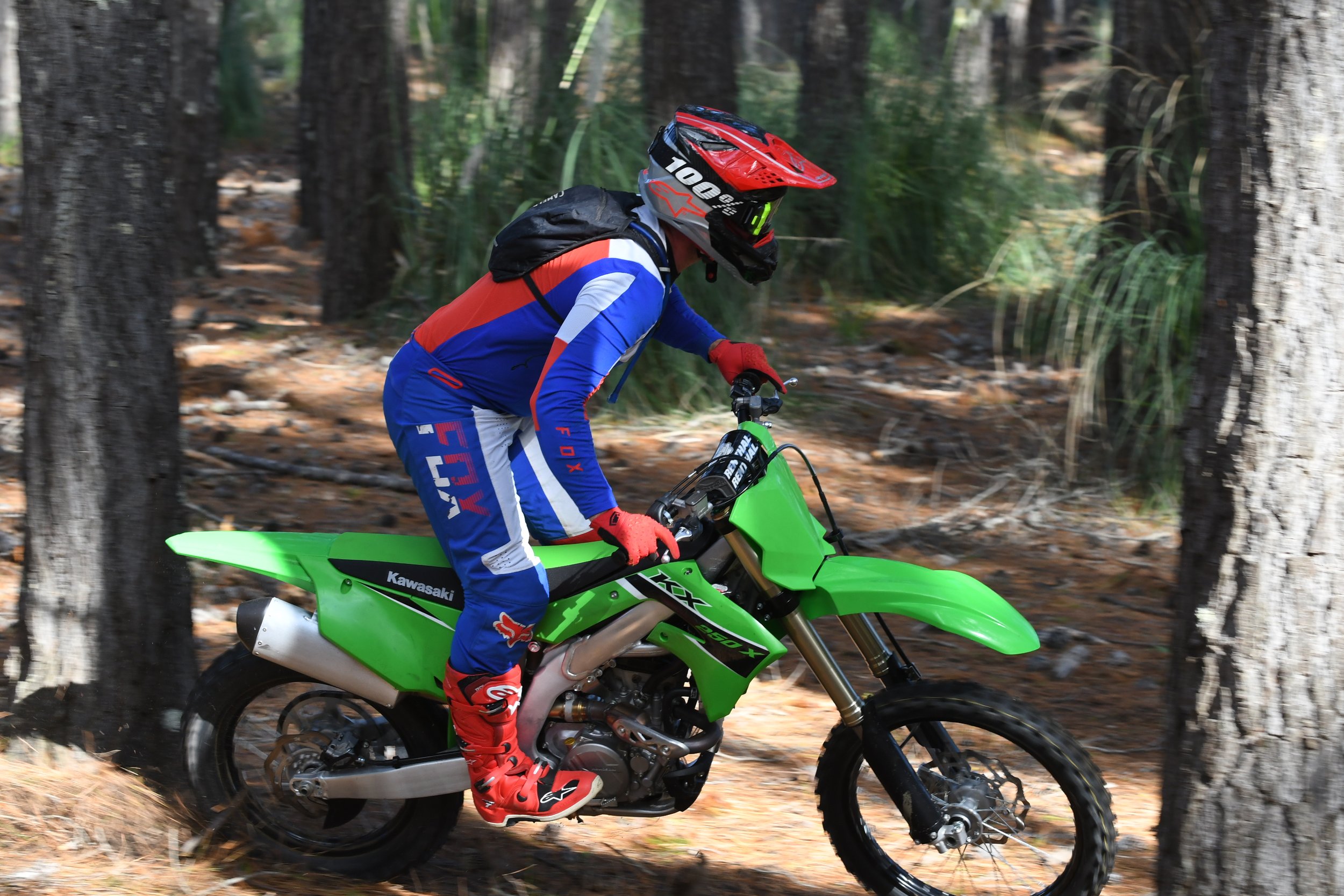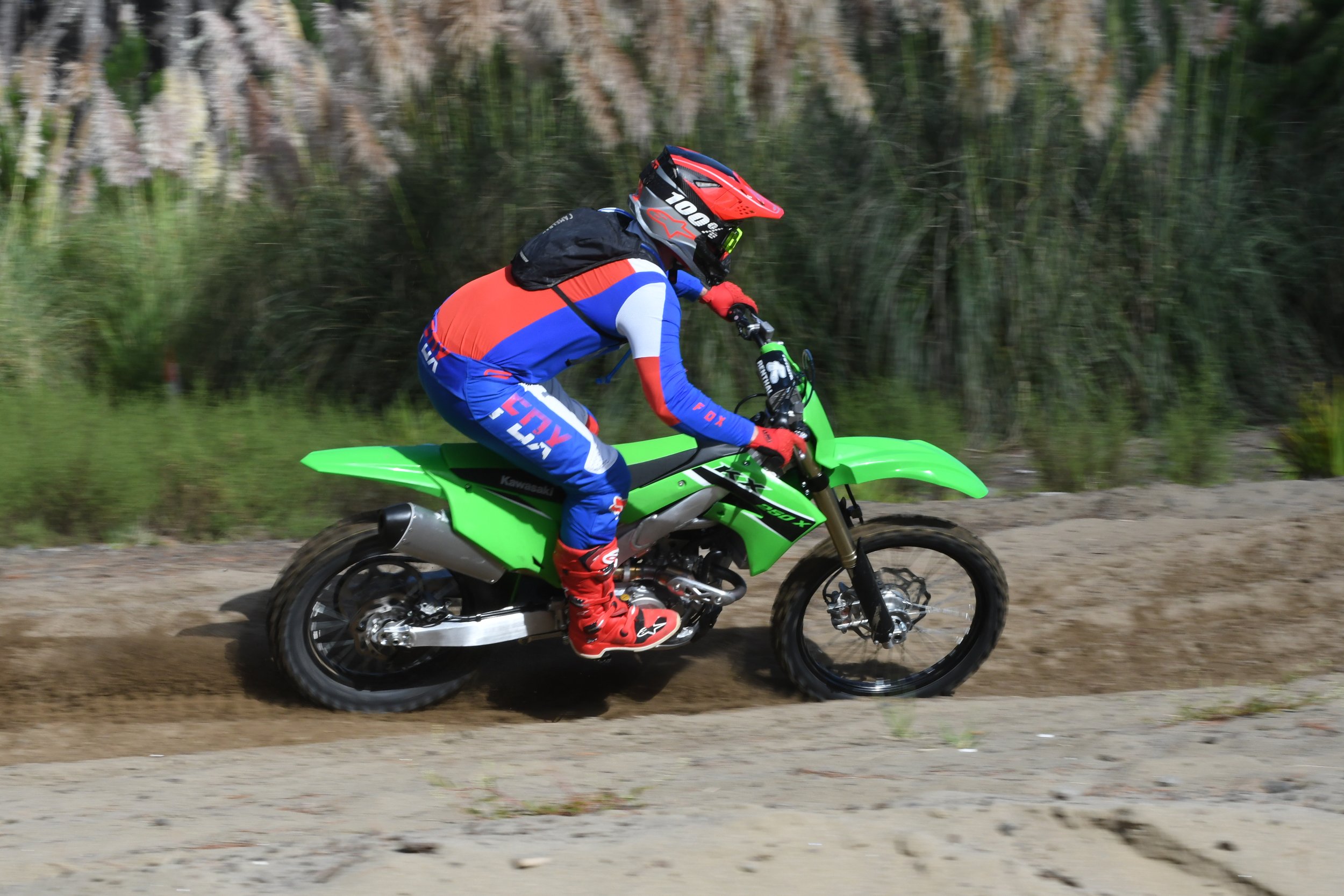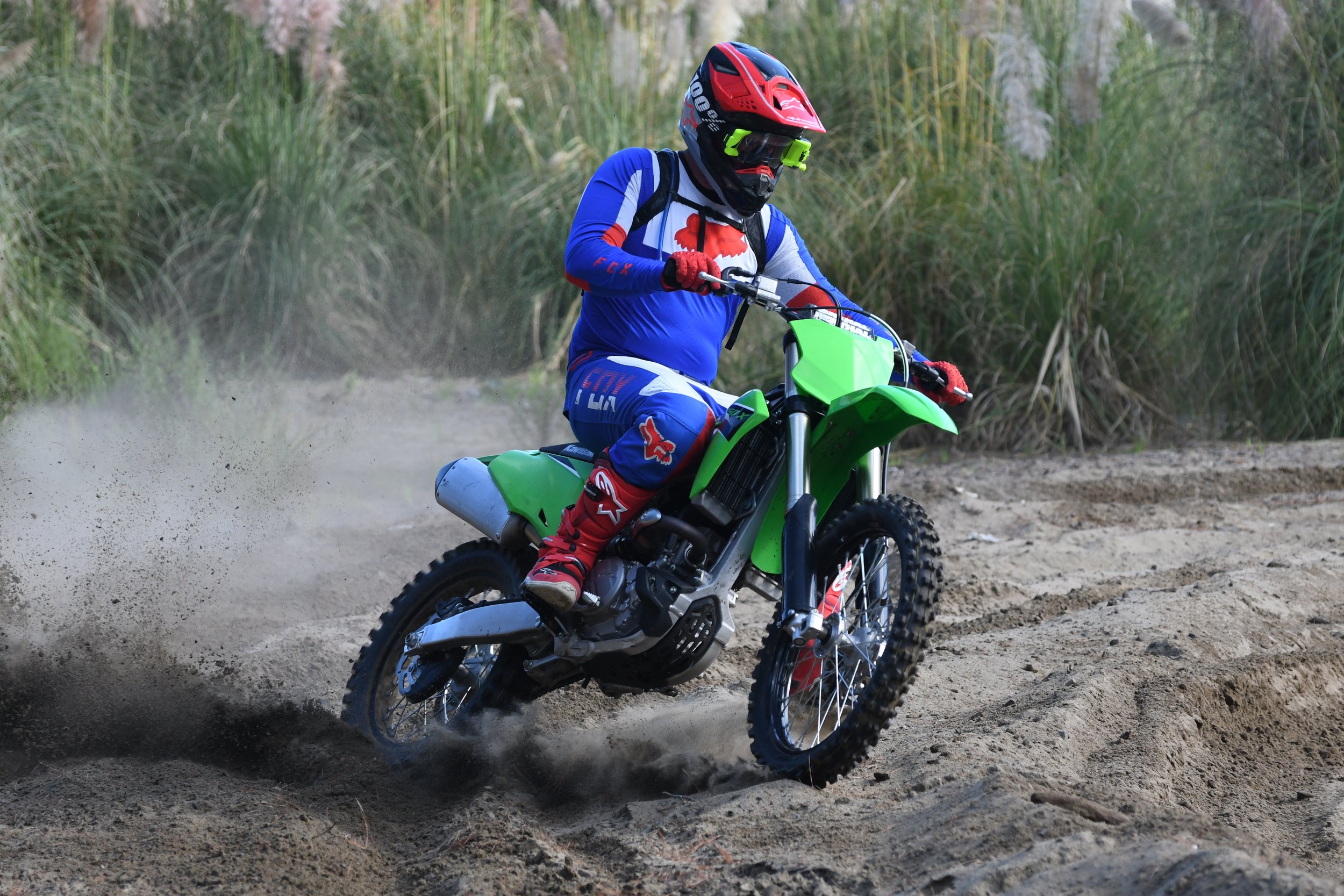TESTED: 2023 KAWASAKI KX250X





Kawasaki Returns to The Dirt Garage in the form of their Lites Class cross-country weapon - the KX250X. Formally going by the callsign XC, the 2023 version swapped out the ‘C’ for a few new updates to what was an already impressive machine. 2021 was the last time I rode a 250 Kawi, so anticipation was high - the same goes for expectations too.
If you lined up the MX model and the X model side by side, the differences aren’t all that obvious. Of course there are the obligatory enduro mods that you would come to expect; 18-inch rear wheel, Dunlop AT81 tyres, side stand, extra tooth on the rear, sump guard, a more off-road spec suspension settings and some mapping changes.
For 2023 specifically, updates to the KX250X see a straighter intake tract to increase airflow, reworked intake valves, new piston crown, 100mm longer header pipe, lighter clutch, changes to the gear ratios, and wider footpegs. So, a whole host of small changes directed mostly at the engine to help improve the entire power delivery from idle to limiter.
I took the KX for a solid ride in Woodhill forest, north of Auckland. The mixture of power-sapping sand, tight technical trails and wide-open straights was the perfect location for really putting the KX-X through its paces. The clutch got some abuse, the low-down torque was tested to the max, and the high-speed stability of the Kawi really got a serious workout. In short - it was just as great as the first time we rode it - but perhaps with a little more punch off the bottom.
Here are the Top 10 Things I Think You Should Know about Kawasaki’s all-new 2023 KX250X.
1.
With the 2023 KX250X having only minor updates from 2021, which come off the back of minor changes from the initial KX motorcrosser platform, it is still a bike that works fantastically across a wide variety of terrain and trail situations. As soon as you throw a leg over and feel how comfortable the bike is, you understand why that whole ‘less is more’ approach was clearly the right choice for the green machine. It is such an easy bike to ride slow and fast, with quality components and ergos that for me personally, fitted perfectly.
2.
Like the KX250, the KX250X is equipped with dual fuel injectors. One positioned downstream of the throttle valve (usual spot) and one upstream close to the airbox. This design is said to deliver a smooth and instant response, matched with increased engine output and high RPM. There is no doubt that the power from the 250X exceeds a few other brands without question and is now probably on par with a few others too. Obviously, Kawasaki believes in the two-injector system for its Lites Class bikes and who am I to disagree? I would say there is a little more bottom-end power now too with the recent updates, which is perfect from an off-road riding perspective.
3.
Again, like the KX250, the 250X utilises the hydraulic clutch set up with a single disc spring – which is tops in my books. The ability of a hydraulic clutch to self-adjust and help prevent clutch burnout makes it one of my must-haves these days. The lever is consistent in its feel, pull and lightness. Kawasaki isn’t known for taking up trends early on, but with a huge shift to hydraulic across the whole industry, it’s great to see them on the new X models from the outset. Matched to the unconventional use of coned-disc springs contributes to a lighter clutch actuation when the lever has been pulled in. I loved everything about the 250X clutch (even more than the 450X which is a tad heavier) and even though I did not like the thin lever on the previous models, this time around I had absolutely no complaints with it. So that’s a little head-scratching for me as I was sure I wasn’t going to like them.
4.
The 450X runs the Showa suspension setup, whereas Kawasaki has gone with KYB in the 250X. Why you would have two different brands on the same model range is unclear to me. I can only guess that they believe each is suited to the larger and smaller capacity bikes. And even though I didn’t have many negative comments towards the Showa components on the 450, this KYB setup on the 250 was noticeably better in all areas in my opinion. From how nimble the bike feels to its level of traction on the hard-packed terrain, the 250 chassis was a feeling that everyone raved about. It just didn’t seem to do anything wrong. The valving and spring weights were surprisingly good, even for my weight at 95kg. Honestly, it’s nearly bang-on and I would hesitate to even change the spring rate if I was going to race this thing. The clickers made a decent difference and it gave you real confidence to pick up the speed without worry of losing the front or getting kicked off when it got rough. It reminded me a lot of Yamaha suspension – easy to use, confidence-inspiring right from the start, and consistently the same throughout the entire ride.
5.
The side stand is super, super handy – anyone who trail rides and has used one knows how good it is - much like an electric start. We did encounter a slight issue though if you are the type of rider who spends a lot of time riding on the balls of your feet and gripping with your ankles. My size 13 boots would catch the side stand with the heel and arc it down a bit while riding from time to time. This was true for any boot down to about a size 9. This was a little niggly and noticeable if you are paying attention so something to be mindful of. It did not seem to get caught on anything though – just more of something to be aware of. Not that you are looking at your feet when riding.
6.
You can’t mention any bike in the new KX range without mentioning the ERGO-FIT system of adjustability that comes stock. The upper triple clamp has two sets of handlebar mount holes and reversible, offset handle mounts, giving 4 different options of comfort; 10mm back, stock setting, 15mm forward and 25 mm forward. Handy for getting that cockpit right. But what’s even cooler is the adjustable foot peg brackets, allowing you to lower your foot peg position by 5 mm. So, match that to the handlebars and you have 8 different rider positions to adjust your rider triangle. If you’re a tall guy like me, that 5mm lower footpeg will help get your centre of gravity lower too, helping with balance, stability and cornering. Such an easy addition but only Kawasaki gives you this option out of the box.
7.
The KX250X loves to be revved…a lot. The RPM limit allowed me to hold a gear longer while still accelerating without much sign-off at the end. That is matched to a very impressive mid-range power that will rival even Yamaha in a lot of areas. It is punchy, exciting, smooth and makes you want to go fast. The updates to the engine also increased the bottom-end power, which really helped with slow technical riding. The taller first gear really took advantage of the increae in bottom-end so nice little combo there Kawasaki. The ‘lack’ of power, when compared to the 450 was actually beneficial when it came to stamina. It also allows you to get heavy on the throttle without the repercussions of launching into a tree without warning. I really enjoyed this engine in the sand, just as much as I loved riding the bike at Mot Central a few years ago.
Picture of the 2021 KX250 XC at Moto Central launching out of a corner.
8.
The little things. The electric start worked quick-fire, so good for XC starts – as it should be. The three couplers (stock, hard, soft) are nice, easy and simple to use for quick power curve changes as the track degrades. Actually, so quick you could even swap in the softer hitting map coupler during your gas stop if it started raining and you needed more traction over power. Not as quick as a mapping switch but quicker than a handheld device, that’s for sure. A nice big 270mm front disc was ample for stopping, Renthal Fatbars with a comfortable sweep are stock, slip resistant seat, in-mould graphics, lightweight Li-ion battery, launch control and a very sleek design all come together to make the KX250X a serious option in the off-road department.
9.
Being a 250 and with all the revving you will want to be doing here (trust me) a larger tank will be needed if you really want to be competitive in the racing side of things. Though having said that, you probably wouldn’t be going too much slower if you played in the low-to-mid and short shifted too. Dang I really should have done some lap times to see what worked out quicker. The gearing and gear ratios seemed much better suited to the sand, compared to what I remember on the clay, but being an XC machine I would petition for a sixth gear in the box - I mean…why not right?
10.
So to throw a complete snapper in the works here - as I was finishing this write-up - I found out that the 250X came to me with the mellow plug installed without my knowledge. I thought about how to tackle this new information as I figured it was the stock map I was using. I have decided to just leave the above as is, still written assuming I had the stock map installed, but addressing that vital nugget of information here instead. And now…realising that there was more power available under the hood makes this bike even more impressive, especially since it was ridden in the power-sapping sand of Woodhill Forest. Give it back Kawasaki with the three different plugs - I wanna try the thing in full power mode.
Man – what a bloody fun, exciting, capable and well-handling bike. Of the 450X or 250X – this is still the one I would pick without regret. Plenty of power, great handling, not gonna ruin me. Three real reasons that the Kawasaki 250X should be on your radar.
CLICK HERE for our IN FOCUS review of the 2021/2022 Kawasaki KX450 XC
2023 Kawasaki KX250X Highlights & Specifications
- Same 249cc Engine as the KX250
- Industry leading KYB Suspension
- Dunlop AT81 Tyres
- Skid Plat & Side Stand
- Electric start
- Coned disc-spring hydraulic clutch
- Launch Control Mode
- Easy engine tuning via plugs
- Finger-follower valve actuation
- Off-Road specific brake pads
- ERGO-FIT adjustable ergonomics
- Renthal Fatbar handlebar



























